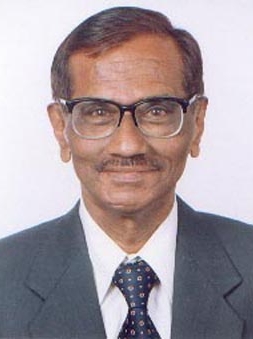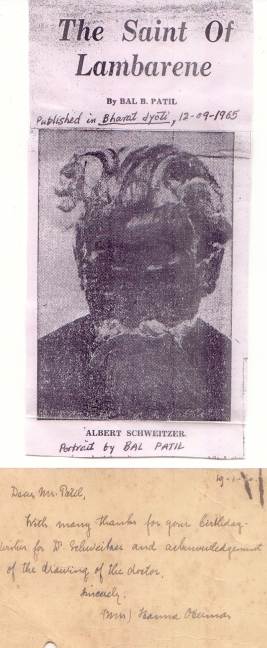
Published in “The Bharat Jyoti” dated. 12.09.1965
Dr. Albert Schweitzer The Saint of Lambarene
In 1955, on the threshold of the eighth decade of his life, Dr. Albert Schweitzer told a British journalist. “All I want for a present is a beautiful vase filled with time. I need more time.”

That was a most characteristic utterance of the great humanitarian and healer who died of the Fourth of September after more than half a century of incessant service for the ailing and the sick in an obscure corner of the “Dark Continent” at Lambarene.
Dr Schweitzer’s death at the ripe age of ninety and in harness brings to close a phenomenal life of the twentieth century. He was the very living embodiment of service to the suffering and neglected humanity in Africa. Endowed with almost superhuman physical and mental energies he utilized them in an unceasing quest for ethical life because he valued and revered life in the true sense of the term.
To embark upon an medical career in Africa was a momentous decision Dr. Schweitzer took in 1905 when he was thirty years old and had already won recognition in the fields of philosophy, theology and music and was the principal of a college of divinity which post he resigned to enroll as a student for a seven years course in medicine.
Why did Dr. Schweitzer choose upon this career when everyone near and dear to him tried to persuade him to abandon such an apparently unreasonable project? As Dr. Schweitzer explains it in his My Life and though: “I wanted to be a doctor that I might be able to work without having to talk. For years I had been giving myself out in words. And it was with joy that I followed the calling of theological preacher. But this new form of activity I could not represent to myself as talking about the religion of love, but only as an actual putting of it into practice”
And more succinctly still Dr. Schweitzer says, “Only a person who can find a value in this sort of activity and devote himself to each one with consciousness of duty has inward right to take as his duty some extraordinary activity instead of that which falls naturally to his lot. Only a person who takes his preference to be a matter of course … and who has no thought of heroism but just recognizes a duty undertaken with sober enthusiasm is capable of becoming a spiritual adventurer such as the world needs. There are no heroes of action only heroes of renunciation and suffering.”
Such a noble and humanitarian conception of duty inspired and sustained Dr. Schweitzer’s life long endeavour. When at the end of successful medical course Dr. Schweitzer went to Lambarene in 1913 “to try and live in the spirit of Jesus” he had to start literally from scratch because there was no building for the hospital.
Dr. Schweitzer started with a windowless broken roofed fowl house for his surgery and his bungalow for the dispensary. Even with such primitive arrangements be treated nearly two thousand patients in his first nine months, and be could say, “How glad I was that in defiance of all objections I had carried out my plan of going out there as a doctor.”
That was the only hospital within a radius of hundreds of miles and diseases were rampant out Dr. Schweitzer took up the challenge in a spirit of dedication. “How can I describe” asks Dr. Schweitzer earnestly”, “my feelings when a poor fellow is brought to me in this (death like agony) conditions? I am the only person within hundreds of miles who can help him. This does not mean merely that I can save his life. We must all die. But that I can save him from days of torture, that is what I feel as my great and ever new privilege. Pain is a more terrible lord of mankind than even death himself.”
This was the guiding principle of Dr. Schweitzer’s medical mission ever since in which, fortunately he was aided by his robust constitution. The extent of the variety of his work can be gathered by looking at his daily routine when he was seventy.
Day begins at 6-45 when he sets the workmen to their various tasks which has to be supervised by him personally in every detail Breakfast time from 7-30 to 8 when the workmen are called in and instructions given for the day, and the materials for gardening, building, forestry, and road repair are issued; and “I run from right to left what wish pumps to repair, missing keys to find, tools to mend, the refrigerators to get going, wood to fetch for the kitchen and laundry; bananas, cassava and maize to buy from the natives who bring it in - et que sala je encore.”
This goes on until 10 o’clock. From 10 to 12.45 medical work. The mid day meal at 12-45 and rest afterwards for all until all until 2. Again he supervises and participates in the outdoor work before returning to the hospital for his afternoon’s pharmacy. If time permits he runs back to the plantation before 5 o’clock to check up on the day’s work, and returns to the hospital to be busy with the sick until 6-30. He returns then to his bungalow for an hour’s practice on the piano organ. “But often I am too tired, especially after I am too fired, especially after a run to the plantation, and so I am obliged to rest until supper and play the piano afterwards.”
After supper if nothing prevents. “I belong to myself”. Then he attends to correspondence, or works at his book on philosophy. About 11-30 he goes down to the hospital again with his petrol lamp for a last look at the patients, and to give medicine or injections for the night to insure a sound sleeps for those who are in pain.
Such was the routine Dr. Schweitzer outlined in a letter to his biographer George Seaver. And this severe routine makes Dr. Schweitzer exclaim “But oh for one free day when I could at last sleep enough to get rid of the fatigue which more and more invades me to concentrate entirely on finishing my book, to study the music and play the organ at leisure: to walk, to dream, to read for pure refreshment’s sake. When will that day come? Will it ever come? But meanwhile I give thanks to God who has given me the health and strength to carry on this existence, in so difficult a climate. I am upheld by the privilege of being allowed to give myself to those in pain.”
Dr. Schweitzer’s work was all permeated with a philosophy, which he described with the name Reverence for Life. This ethic enables one to transcend the traditional ethics operating between man and man only “To the man who is truly ethical.” Describes Dr. Schweitzer his Reverence for life, “all life is sacred, including that which from the human point of view seems lower in scale.” It is a Weltanschauung which is essentially life affirming.
Among Dr. Schweitzer’s books is The Indian Thought and its Development. It is a profound philosophical study concerned with the evolution of the Indian thought from Vedic times onwards to the present day. Dr. Schweitzer’s conclusions in this book have been criticized especially on the ground that he regards all Hindu thought as world and life negating and pessimistic which is not true because when he began the study be found himself “assailed with doubts” as to whether Schopenhauer’s account of Indian philosophy that it is entirely pessimistic could be correct.
However, Dr. Schweitzer came to a negative conclusion that the Hindu view of life is predominantly pessimistic because it has not been able to fuse together its pessimistic and optimistic elements into a mysticism of ethical action. He rejected Gitaistic Philosophy as unnatural because “it grants recognition to activity, but only after activity has renounced natural motives and its natural meaning” Significantly Dr. Schweitzer ranks the ethic of action as expressed in the great Tamil book Tirukkural, hailed as the Tamil Vedas as “the living ethic of love”, of the world a collection of maxims in which we find so much wisdom”.
Dr. Schweitzer speaks in glowing terms of the principle of Ahimsa non-violence as laid down by Jainism: “The laying down of the commandment not to kill and not to damage is one of the greatest events in the spiritual history of mankind. Starting from its principle, founded on world and life denial of abstention from action, ancient Indian thoughts and this is a period when in other respects ethics have not progressed very far reaches the tremendous discovery that ethics know no bounds. So far as we know this is for the first time clearly expressed by Jainism.”
Dr. Radhakrishnan, the President of India, who made a detailed criticism in the book “Eastern Religions & Western Thought” of Dr. Schweitzer’s conclusions regarding Indian thought said aptly that “the life and work of Dr. Schweitzer are themselves an example of disciplined asceticism at a time when both purpose and discipline are lacking in the world.”
Dr. Schweitzer lived up to the precept, “To whom much is given to him shall much be required” and gave his all unflinchingly and dedicatedly.